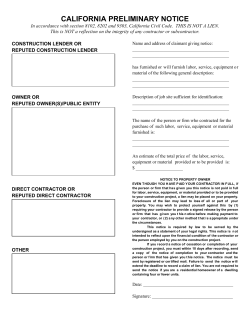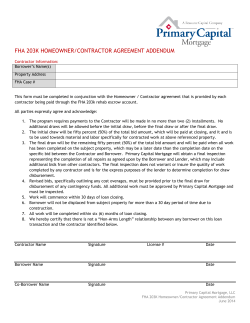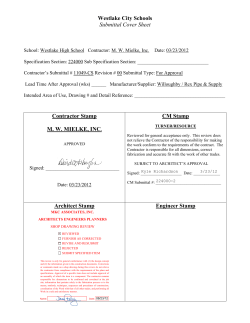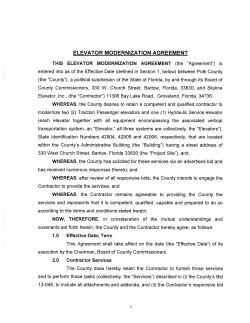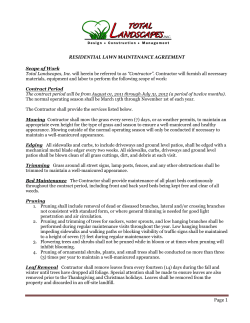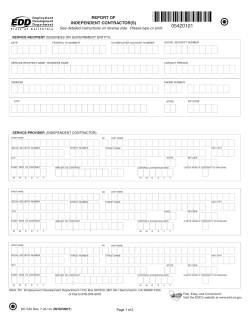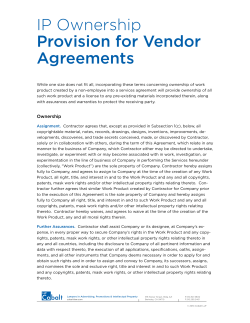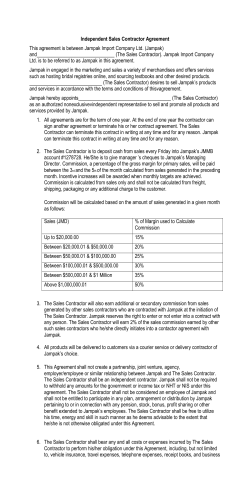
How do performance bonds and parent company guarantees work? Journal
How do performance bonds and parent company guarantees work? Reproduced by kind permission of RICS Construction Journal February 2009 Two of the most common forms of security used by employers to provide protection in the event of a contractor's default are Performance Bonds (PBs) and Parent Company Guarantees (PCGs). PBs are typically provided by banks or insurance companies. They give the employer a guarantee of payment up to a stated amount of money should they suffer a loss as a result of the contractor's breach of his contractual obligations (the industry standard is 10 per cent of the initial contract sum). PCGs are provided by either the contractor's immediate parent or other holding company and operate as a guarantee to ensure a contract is properly performed and completed. In the event of a contractor default, the parent is obliged to remedy the breach. If the contractor is no longer able or willing to continue with the works, the parent will be obliged to meet all of the contractor's obligations and complete the works to the standard specified in the terms of the original contract. PBs and PCGs provide different remedies, types and levels of protection to the employer for contractor default. If both forms of security are available, the factors outlined below should be considered to assess which remedy is the most appropriate for the development in question. PBS AND PCGS – A COMPARISON Protection A PB gives the comfort of being a payment guarantee from an independent third party, whereas the strength of a PCG is directly related to the financial covenant of the parent. In assessing the adequacy of the PCG, an employer should be satisfied with the identity of the parent and similarly should insist that any PB be from a reputable guarantor. Cost/availability A contractor will normally charge a premium for the provision of a PB whereas a PCG should not have a cost implication for the contractor (with the exception of administration fees). Of course, a PCG will not be available if the contractor has no parent and may not be desirable if the proposed parent does not have a good financial covenant. Cover A PB does not guarantee completion of the project, just recovery of financial loss up to a stated maximum amount. A PCG does guarantee the continuing performance of the contract, but is of little benefit if the parent is equally unable to perform the contract (e.g. group insolvency). Duration Typically, PBs only operate for the period in which the contractor has immediate obligations to carry out the works in question and expires at either practical completion or the end of the 12 month rectification period. However, a PCG will often be co-extensive with the maximum duration of the liability the contractor has under the underlying contract (i.e. six or 12 years depending on whether the contract has been executed under hand or as a deed) and covers the contractor's liability for the remedying of latent defects. Insolvency An event of insolvency alone will not necessarily give rise to payment entitlement under a standard unamended ABI form of PB, as this may be treated as an event terminating the main contract. Equally, the terms of each PCG will need to be reviewed to ensure they cover an event of insolvency. Enforcement It is notoriously difficult to obtain payment under a PB. A bondsman would ordinarily require the breach of contract to be upheld either in adjudication or court proceedings and the employer would be required to provide clear evidence of the loss it has suffered as a result of the contractor's breach. CONTACT Please talk to your usual Nabarro contact or Terry Fleet, Partner T +44 (0)20 7524 6172 [email protected] London Sheffield Brussels Lacon House, 84 Theobald's Road, London WC1X 8RW T +44 (0)20 7524 6000 F +44 (0)20 7524 6524 1 South Quay, Victoria Quays, Sheffield S2 5SY T +44 (0)114 279 4000 F +44 (0)114 278 6123 209A Avenue Louise, 1050 Brussels, Belgium T +32 2 626 0740 F +32 2 626 0749 Alliance firms: France August & Debouzy Gilles August T +33 (0)1 45 61 51 80 www.august-debouzy.com Germany GSK Stockmann & Kollegen Rainer Stockmann T +49 (30) 20 39 07 - 0 www.gsk.de Italy Nunziante Magrone Gianmatteo Nunziante T +39 06 695181 www.nunziantemagrone.it Spain Rodés & Sala Gonzalo Rodés T +34 932 413 740 www.rodesysala.com Nabarro LLP Registered office: Lacon House, 84 Theobald's Road, London, WC1X 8RW. Nabarro LLP is a limited liability partnership registered in England and Wales (registered number OC334031) and is regulated by the Solicitors Regulation Authority. A list of members of Nabarro LLP is open to inspection at the registered office. The term partner is used to refer to a member of Nabarro LLP. Disclaimer Detailed specialist advice should be obtained before taking or refraining from any action as a result of the comments made in this publication, which are only intended as a brief introduction to the particular subject. This information is correct on the date of publication. We cannot be responsible for links to external websites that may become broken in the future. © Nabarro LLP 2009
© Copyright 2026
